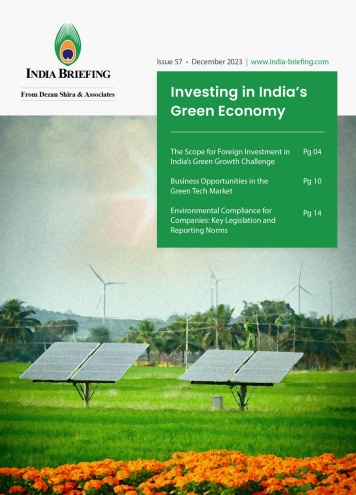-
Other Briefings
- Subscribe
India’s Sports Goods Manufacturing and Export: Growth, Hubs, and Opportunities
Discover how India’s sports goods industry is expanding globally, powered by manufacturing clusters in Meerut and Jalandhar, rising startup activity, and major investments from global brands like Decathlon, Nike, and Adidas.
How Indian Exporters Can Offset Trump Tariffs Using US Foreign-Trade Zones
Amid Trump-era tariff tensions, Indian analysts see import-export opportunities via the US Foreign-Trade Zone (FTZ) system, as the central government launches a national help desk to support its domestic traders.
India's GST Compliance Changes from April 1, 2025: All You Need to Know
From April 1, 2025, India’s GST compliance will see major changes, including mandatory multi-factor authentication (MFA), stricter e-way bill (EWB) rules, mandatory Input Service Distributor (ISD) registration, and a lower e-invoicing threshold.
Mental Health at Work: A Strategic Priority for Businesses in India
Learn how Indian businesses are prioritizing workplace mental health through strategic policies, legal frameworks, and CSR initiatives to boost employee well-being and productivity.
-
India’s Sports Goods Manufacturing and Export: Growth, Hubs, and Opportunities
Industries Apr 18 -
Mental Health at Work: A Strategic Priority for Businesses in India
Human Resources & Payroll Apr 17 -
India’s Semiconductor Market Value to Reach US$108 Billion by 2030: Report
Industries Apr 17 -
How Indian Exporters Can Offset Trump Tariffs Using US Foreign-Trade Zones
Economy & Trade Apr 16 -
Corporate Taxation and Compliance Regime in India
Tax & Accounting Apr 14
Get free access to our subscriptions and publications
Subscribe to receive weekly India Briefing news updates, our latest doing business publications, and access to our Asia archives.
Sign Up Now
Economy & Trade
How Indian Exporters Can Offset Trump Tariffs Using US Foreign-Trade Zones
Apr 15Amid Trump-era tariff tensions, Indian analysts see import-export opportunities via the US Foreign-Trade Zone (FTZ) system, as the central government launches a national help desk to support its domestic traders.
-
Import and Export Procedures in India
Economy & Trade Apr 11Businesses planning to import or export from India must understand the stages involved in the process, the regulatory framework, and documentation required.
-
India Gains Temporary Relief as Trump Suspends Reciprocal Tariffs for 90 Days
Economy & Trade Apr 09India receives temporary relief from the 26 percent US import duty as Donald Trump announces a 90-day suspension of reciprocal tariffs on all countries except China on April 9, 2025.
-
US Hikes Tariff on Indian Imports to 26%: All You Need to Know
Economy & Trade Apr 04The US has announced sweeping tariffs, with a 26 percent duty on Indian products. While key industries like gems and jewelry, textiles, and agriculture are likely to face disruption, India’s pharmaceutical sector remains exempt from these tariffs.
-
India-Australia Deepen Economic Ties with Ambitious 2025 Roadmap
Economy & Trade Apr 03Australia’s new roadmap, unveiled in 2025, aims to strengthen trade and investment ties with India by focusing on high-potential sectors, promising economic growth and enhanced collaboration.
Tax & Accounting
Corporate Taxation and Compliance Regime in India
Apr 14In this edition of India Briefing Magazine, we explore India's latest corporate tax framework, which offers a comprehensive set of provisions that cater to diverse business structures, industry sectors, and operational models.
-
Claiming Foreign Tax Credit in India: Step-by-Step Guide to Form 67 Compliance
Tax & Accounting Apr 02Foreign Tax Credit (FTC) can be claimed in India through Form 67. We provide you with details on eligibility, filing steps, and best practices to ensure compliance and maximize tax benefits.
-
India Revises Tax Audit Reporting with Form 3CD Changes Effective April 1, 2025
Tax & Accounting Mar 31India has implemented revisions to Form 3CD, effective from April 1, 2025, requiring businesses and tax professionals to adhere to enhanced disclosure requirements under the updated tax audit regulations.
-
India's GST Compliance Changes from April 1, 2025: All You Need to Know
Tax & Accounting Mar 31From April 1, 2025, India’s GST compliance will see major changes, including mandatory multi-factor authentication (MFA), stricter e-way bill (EWB) rules, mandatory Input Service Distributor (ISD) registration, and a lower e-invoicing threshold.
-
Mandatory ISD Registration Under GST Begins April 1, 2025: What Businesses Need to Know
Tax & Accounting Mar 27From April 1, 2025, India will require mandatory ISD registration under GST to ensure accurate tax credit distribution and compliance. India Briefing explores the key changes and their potential impact on businesses in the country.
Legal & Regulatory
Import and Export Procedures in India
Apr 11Businesses planning to import or export from India must understand the stages involved in the process, the regulatory framework, and documentation required.
-
SEBI Amends ICDR Regulations for Capital Raising and Disclosure Norms
Legal & Regulatory Apr 09SEBI’s 2025 amendments to ICDR Regulations overhaul norms for public offers, rights issues, and SAR disclosures. Learn what’s changed and how it impacts issuers and investors.
-
MCA Proposes Expansion of Fast-Track Merger Rules in India
Legal & Regulatory Apr 08To streamline corporate restructuring and boost ease of doing business in India, the Ministry of Corporate Affairs has proposed expanding fast-track mergers under Section 233 of the Companies Act, 2013.
-
Mandatory ISD Registration Under GST Begins April 1, 2025: What Businesses Need to Know
Legal & Regulatory Mar 27From April 1, 2025, India will require mandatory ISD registration under GST to ensure accurate tax credit distribution and compliance. India Briefing explores the key changes and their potential impact on businesses in the country.
-
India Adopts Proof of Origin in New Customs Compliance Framework
Legal & Regulatory Mar 24India’s new CAROTAR Rules require Proof of Origin instead of traditional certificates. Understand the compliance impact, documentation updates, and industry concerns.
Industries
India’s Sports Goods Manufacturing and Export: Growth, Hubs, and Opportunities
Apr 18Discover how India’s sports goods industry is expanding globally, powered by manufacturing clusters in Meerut and Jalandhar, rising startup activity, and major investments from global brands like Decathlon, Nike, and Adidas.
-
India’s Semiconductor Market Value to Reach US$108 Billion by 2030: Report
Industries Apr 16India's semiconductor market is set to double to US$108B by 2030, according to the latest industry report. The growth is likely to be driven by domestic demand, design expertise, and strategic policies fostering localization and global partnerships.
-
India Manufacturing Tracker 2025
Industries Apr 14Introducing the India Manufacturing Tracker 2025 by India Briefing—your go-to source for real-time updates on the country's industrial production, emerging trends, and key sector insights.
-
Apple, Foxconn Boost iPhone Output in India as US Tariffs Reshape Supply Chains
Industries Apr 07Apple's iPhone production in India is being expanded to 25–30 million units by 2025, driven by Foxconn’s Bengaluru facility and a strategic shift from China amid US tariffs.
-
India Announces PLI Scheme for Passive Electronics with INR 229.19 Billion Budget
Industries Apr 01On March 28, 2025, India launched a INR 229.19 billion (US$2.68 billion) Production Linked Incentive (PLI) scheme to boost the domestic manufacturing of passive electronics, with a six-year implementation plan.
HR & Payroll
Mental Health at Work: A Strategic Priority for Businesses in India
Apr 17Learn how Indian businesses are prioritizing workplace mental health through strategic policies, legal frameworks, and CSR initiatives to boost employee well-being and productivity.
-
A Guide to Minimum Wage in India in 2025
HR & Payroll Mar 17We answer some frequently asked questions foreign hiring managers may have regarding the minimum wage in India. In January 2025, Meghalaya became the latest region to revise the minimum wages of all categories of workers in the state.
-
India’s Tech Workforce Shifts as GCCs Outpace Traditional IT Firms
HR & Payroll Mar 10India’s tech sector is witnessing a major workforce hiring shift in 2025, led by the rise of GCCs, changing business models, and AI adoption.
-
India Offers Tax Relief for Foreign Tech Experts to Boost Electronics Manufacturing Sector
HR & Payroll Feb 11India has introduced a tax relief measure for highly skilled foreign engineers, tech experts, and support teams. This new policy will allow companies to bring in specialists, including those from China, for short-term assignments.
-
Employee Retention Strategy in India: Corporate Sector Explores New Retirement Options in 2025
HR & Payroll Feb 07We discuss how domestic and foreign companies operating in India can strengthen their employee retention by tapping into diverse retirement plans that provide the workforce with long-term financial security and optimize tax efficiency.
Expert Guidance about Business in Asia
Dezan Shira & Associates is a pan-Asia, multi-disciplinary professional services firm, providing market entry, legal, accounting, tax, HR, technology and operational advisory to international investors.
Business Updates for All Asia Markets
Asia Briefing publishes articles, magazines, and guides on doing business in Asia. Dezan Shira & Associates has produced the publication since 1999.
Need More Guidance?
India Briefing Publications
Download magazines and guides on doing business in India.
Download Now




















